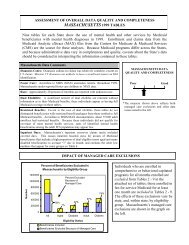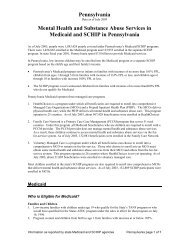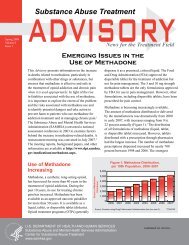106CommonGround. CommonGround (CG) is a program that supports shared decision-mak<strong>in</strong>gand offers electronic decision support <strong>in</strong> psychiatry (Deegan, 2007a).Developed by Patricia Deegan, Ph.D., it does not meet formal criteria as a decisionaid, but does fulfill several of the related functions noted earlier. CG entails transform<strong>in</strong>ga wait<strong>in</strong>g room <strong>in</strong> a mental health cl<strong>in</strong>ic <strong>in</strong>to a “peer-run <strong>Decision</strong> SupportCenter.” Individuals who are <strong>in</strong> recovery from psychiatric disorders staff the centerand <strong>in</strong>vite arriv<strong>in</strong>g consumers to use a Web-based software program that helps organizethe concerns the consumer wants to raise with his or her cl<strong>in</strong>ician. The consumerchooses whether to read or listen to the program, which can be completed <strong>in</strong>about 20 m<strong>in</strong>utes or less. The software generates a one-page report for the consumerto br<strong>in</strong>g to the appo<strong>in</strong>tment. The program also <strong>in</strong>cludes brief vignettes of people tell<strong>in</strong>gtheir recovery stories.Each consumer may use an electronic version of his or her report as a portal for connect<strong>in</strong>gto a variety of <strong>in</strong>formation <strong>in</strong>clud<strong>in</strong>g DAs and factsheets. Through a simple<strong>in</strong>terface, a consumer can graph recovery and access decision support worksheetsand peer support to help resolve decisional uncerta<strong>in</strong>ty about medication.Evidence Regard<strong>in</strong>g Effectiveness of DAs <strong>in</strong> <strong>Mental</strong> <strong>Health</strong> <strong>Care</strong>Very few studies have been done to assess the use of DAs <strong>in</strong> mental health care(Hamman, Leucht, & Kissl<strong>in</strong>g, 2003). Indeed, Adams and Drake po<strong>in</strong>t out, “In themental health field. . . shared decision-mak<strong>in</strong>g is a relatively novel and somewhatcontroversial concept” (2006, p. 88). One possible reason for the paucity of DAs<strong>in</strong> mental health care, and for the lack of research on them, may be the presence ofmore significant barriers to the creation of DAs <strong>in</strong> mental health than <strong>in</strong> physicalhealth. The IOM (2006) focuses on prejudice, discrim<strong>in</strong>ation, and coercion as thepr<strong>in</strong>cipal reasons why mental health consumers may not always “receive care thatis respectful of and responsive to their <strong>in</strong>dividual preferences, needs, and values” (p.77), and why there is less support available for mental health consumers’ decisionmak<strong>in</strong>g.Prejudice and the result<strong>in</strong>g discrim<strong>in</strong>ation lead to questions about mentalhealth consumers’ decision-mak<strong>in</strong>g capacity, which is irrelevant for most of them.<strong>Mental</strong> health consumers have been shown to be competent to make decisions regard<strong>in</strong>gtheir own care (Hamann et al., 2006). Accord<strong>in</strong>g to the IOM (2006, p. 97),“research has shown that although patients’ decision-mak<strong>in</strong>g performance is correlatedmodestly with psychotic symptoms, it is correlated more strongly with cognitivedysfunction.” Adams and Drake concluded their recent paper by say<strong>in</strong>g, “Researchon shared decision-mak<strong>in</strong>g <strong>in</strong> mental health lags considerably beh<strong>in</strong>d work <strong>in</strong>general medic<strong>in</strong>e and urgently needs attention” (2006, p. 100).Types of DAs That Might be Adapted for Use <strong>in</strong> <strong>Mental</strong> <strong>Health</strong> <strong>Care</strong>Because def<strong>in</strong>itive outcome data are relatively lack<strong>in</strong>g <strong>in</strong> the field, DAs for mentalhealth might need to focus more on the options that consumers face, and some of the<strong>Shared</strong> <strong>Decision</strong>-<strong>Mak<strong>in</strong>g</strong> <strong>in</strong> <strong>Mental</strong> <strong>Health</strong> <strong>Care</strong>: Practice, Research, and Future Directions
107potential results, than on quantitative data. Moreover, DAs for mental health mightbe thought of broadly, and encompass decisions regard<strong>in</strong>g issues such as hous<strong>in</strong>g,education, and employment as well as the medical aspects of care (e.g., medicationand various forms of psychotherapy). Web-based aids could be developed to helpmental health consumers make decisions about their treatment. Brief video clipsshow<strong>in</strong>g <strong>in</strong>dividuals who have confronted various decisions, and how they thoughtthem through, might help consumers by demonstrat<strong>in</strong>g that others have faced similarconcerns and have made decisions that were appropriate for them. Also, as notedearlier, some DAs for <strong>in</strong>dividuals with mental illnesses might be thought of as toolsnot to be used once, but to be returned to over time.Aids such as the <strong>Decision</strong> Board might be adapted for mental health care. The <strong>Decision</strong>Board was devised by Canadian physicians to help women with breast cancerdecide on a course of treatment. The board consists of a set of panels, each coveredby a slid<strong>in</strong>g door. Dur<strong>in</strong>g an appo<strong>in</strong>tment, the patient and her physician open thepanels <strong>in</strong> succession and read the <strong>in</strong>formation, stopp<strong>in</strong>g to discuss the patient’s specificsituation. The patient also receives a copy of the <strong>Decision</strong> Board on paper tohelp her recall the <strong>in</strong>formation (Supportive Cancer <strong>Care</strong> Research Unit, 2008; ACSNews Center, 2003). Research has demonstrated that the <strong>Decision</strong> Board helpedwomen feel more knowledgeable about their chances of recurrence and better satisfiedwith their decision-mak<strong>in</strong>g.Issues Related to Implementation <strong>in</strong> <strong>Mental</strong> <strong>Health</strong> <strong>Care</strong>The use of DAs <strong>in</strong> mental health care can empower the consumer to be a genu<strong>in</strong>edecision-mak<strong>in</strong>g partner and can help foster mutual respect among consumers,doctors, nurses, case managers, and others as they all seek to support the recoveryprocess. The word “empower” is especially mean<strong>in</strong>gful <strong>in</strong> this context, because thepower disparity between providers and consumers can impose a particular burdenon the latter, as observed <strong>in</strong> the discussion below.How is the Use of DAs <strong>in</strong> <strong>Mental</strong> <strong>Health</strong> <strong>Care</strong> Different From Their Use <strong>in</strong> Physical<strong>Health</strong> <strong>Care</strong>?In physical health care, at least for certa<strong>in</strong> forms of treatment, there may be moreobjective criteria accord<strong>in</strong>g to which decisions can be made. The relative likelihoodof one outcome or another result<strong>in</strong>g from a course of action can be estimated reasonablywell for many physical conditions, and the outcomes themselves are perhapsmore quantifiable. For mental health conditions, there is often less evidence, lesscerta<strong>in</strong>ty of a particular outcome, and less clarity as to which outcome is best. Thus,DAs <strong>in</strong> mental health might be usefully seen as help<strong>in</strong>g the consumer evaluate tradeoffs,for example, th<strong>in</strong>k<strong>in</strong>g about the side effects and effects of beg<strong>in</strong>n<strong>in</strong>g or end<strong>in</strong>g use ofmedications, and of other potential steps that might enhance recovery.<strong>Shared</strong> <strong>Decision</strong>-<strong>Mak<strong>in</strong>g</strong> <strong>in</strong> <strong>Mental</strong> <strong>Health</strong> <strong>Care</strong>: Practice, Research, and Future Directions
- Page 4:
iiContentsIntroduction ............
- Page 11 and 12:
5outpatient commitment (Holmes-Rovn
- Page 13 and 14:
7Advantages• Practitioners can be
- Page 15:
9Section 2The Practice of SharedDec
- Page 22 and 23:
16Section 3SDM ResearchCurrent rese
- Page 24:
18Mental health care providers are
- Page 27 and 28:
21want mental health treatment or d
- Page 29:
23Some participants raised concerns
- Page 37 and 38:
31Section 6ConclusionsShared decisi
- Page 39 and 40:
33Fellowes, D., Wilkinson, S., & Mo
- Page 41 and 42:
35Power, A. Kathryn. (July 10, 2007
- Page 43 and 44:
37Appendix AResourcesThis list is p
- Page 45 and 46:
39Appendix BShared Decision-MakingM
- Page 47 and 48:
41Annelle Primm, M.D., M.P.H.Direct
- Page 49 and 50:
43Supplement 1Shared Decision-Makin
- Page 51 and 52:
45IntroductionThe consumer-driven r
- Page 53 and 54:
47Background: Definitions of SDM an
- Page 55 and 56:
49• Freedom to live in the commun
- Page 57 and 58:
51providers only (Wills & Homes-Rov
- Page 59:
53SDM for Schizophrenia TreatmentBu
- Page 63 and 64: 57I interact with my consumers; I f
- Page 65 and 66: 59ReferencesAdams, J. R., & Drake,
- Page 67 and 68: 61Elwyn, G., Edwards, A., Kinnersle
- Page 69 and 70: 63Murray, E., Pollack, L., White, M
- Page 71 and 72: 65Thistlethwaite, J., Evans, R., Ti
- Page 73 and 74: 67AbstractShared decision-making is
- Page 75 and 76: 69Confronting Critical Challenges:
- Page 77 and 78: 71into treatment should still be in
- Page 79 and 80: 73these approaches, people are more
- Page 81 and 82: 75consumers to engage with their pr
- Page 83 and 84: 77that were produced in the U.S., w
- Page 85 and 86: 79a healing partnership and develop
- Page 87 and 88: 81Shared Decision-Making in Mental
- Page 89 and 90: 83However, peer support requires st
- Page 91 and 92: 85ConclusionsImplementation of SDM
- Page 93 and 94: 87Fellowes, D., Wilkinson, S., & Mo
- Page 95 and 96: 89President’s Commission for the
- Page 97 and 98: 91Supplement 3Aids to Assist Shared
- Page 99 and 100: 93IntroductionSignificance of Share
- Page 101 and 102: 95In recent years, a variety of tec
- Page 103 and 104: 97• Provide balanced information,
- Page 105 and 106: 99Form of Access or AdministrationC
- Page 107 and 108: 101ences). Some of these Web-based
- Page 109 and 110: 103video about shared decision-maki
- Page 111: 105clarify one’s own values and p
- Page 115 and 116: 109Once again, however, it is worth
- Page 117 and 118: 111who belong to minority groups or
- Page 119 and 120: 113Hamann, J., Langer, B., Winkler,
- Page 122: U.S. DEPARTMENT OF HEALTH AND HUMAN
















